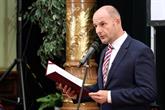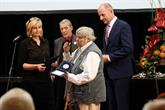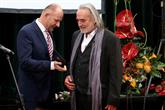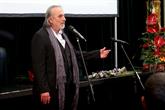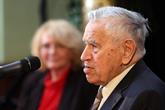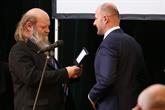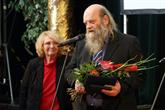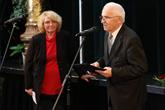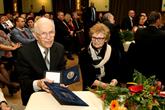On the eve of November 17 celebrations, the President of the Pilsen Region, Josef Bernard, handed over the Honorary Plaques of the President of the Pilsen Region for courageous civic attitudes to five personalities.
Jiřina Fuchsová, Vladimír Líbal, Jiří Světlík, Miroslav Svoboda and Stanislav Šmic took over the Commemorative Sheet and the Honorary Plaque of the President of the Pilsen Region from the hands of President Josef Bernard for courageous civic attitudes in Měšťanská beseda in Pilsen today. The awards were handed over by the President together with the dissident and the Charter 77 signatory Petr Uhl and the journalist Petra Procházková.
"It is my honour to hand over the Honorary Plaque of the President of the Pilsen Region for personal bravery to the five brave people who have a connection to our region and who, with their former attitudes, contributed to the fact that we now live in a free democratic country. Their merits and personal bravery with which they acted at a time when different opinions were not desired, and when people were punished for their opinions and attitudes, must be constantly reminded. These people are usually not very well-known or famous, and but that is precisely why they deserve more of our attention," said President Josef Bernard.
The ceremony, presented by Lída Rakušanová, took place in the small hall of the Měšťanská beseda in Pilsen. Short videos introduced the lifelong journey of the winners, and Duo Komáři with the bass guitarist Dan Zita played several songs.
The author of the Honorary Plaque of the President of the Pilsen Region for courageous civic attitudes is
doc. M.A. Petr Vogel. The minted plaque has a diameter of 70 mm, weighs 169 g and is made of silver 999/000. On the front side, there is a portrait of Jan Palach with the text "JAN PALACH 1948-1969", and on the reverse side, there is the emblem of the Pilsen region together with the text "HONORARY PLAQUE OF THE PRESIDENT OF THE PILSEN REGION FOR COURAGEOUS CIVIC ATTITUDES”.
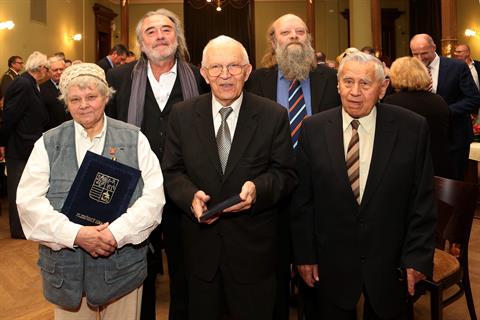
(From the left upper corner) Vladimír Líbal, Miroslav Svoboda,
(down) Jiřina Fuchsová, Stanislav Šmic, Jiří Světlík
Jiřina Fuchsová (born in Pilsen, on October 2, 1943)
Jiřina Fuchsová emigrated from Czechoslovakia to Los Angeles in 1963. However, she has never ceased to be interested in the events in Czechoslovakia and in the Czech Republic respectively. She was engaged in a number of expatriate activities; she had a samizdat publishing house. She also co-founded the Czechoslovak Culture Club and the Czechoslovak Institute of Los Angeles.
After 1989, she was among the organizers of the Civic Forum and devoted a lot of energy to building the Memorial of Foreign Czechs. She struggled for herself and another 30,000 compatriots to receive back their Czech citizenship, as on the basis of a Czechoslovak-American treaty of the 1920s, a person who left one country for another automatically lost the citizenship of the first state.
She has been living in Pilsen since 2013.
BcA. Vladimír Líbal (born in Mělník on November 11, 1954)
At the turn of the 1970s and 1980s, Vladimír Líbal co-produced a musical theatre in Mělník, which satirically dealt with the political and social situation at that time and with which he toured the whole country, which resulted in the Secret Police’s interest in his person. In protest against the imprisonment of Heřman Chromý, the co-author of those theatrical productions, Líbal signed the Charter 77 Declaration in 1987 and joined in Pilsen independent activities.
He then was repeatedly interrogated by the Secret Police, and in 1988, he was held in a so-called pre-trial detention in Pilsen-Bory prison for two days. In November 1989 he co-founded the Civic Forum in Pilsen and Klabava, and since June 1990, he was a deputy of the then Czech National Council for two years.
He illustrated the only colourful samizdat edition of the fairy-tale book "The Devil's Hoof", which contained fairy tales
of many writers silenced at that time.
Jiří Světlík (born in Pilsen on March 11, 1924)
In 1944, he was deployed to fascist Germany, and in the same year he was arrested by the Gestapo for helping the "enemy", for preparation for treason and dismantling the German armed forces. The trial was not executed because the courthouse in Dresden was destroyed by the raid of the allied forces.
After 1948, he worked in a ceramic transfer printing company in Loket, where he was a co-founder of an illegal group formed in order to get information about the uranium mines in Horní Slavkov and hand it over to Western rapporteurs. Their activity was revealed and the members of the group were arrested. The court sentenced him to 20 years of imprisonment and forfeiture of all property. He was released from jail on amnesty ten years later.
After 1989, he devoted himself to the restoration of the Scout Movement. Today, Jiří Světlík gives lectures on totality and discusses with students in schools.
Miroslav Svoboda (born in Hořice v Podkrkonoší on September 6, 1962)
In the 1980s, Miroslav Svoboda was a member of the West Bohemian Coordination Committee of the Civil Liberties Movement, which at that time was one of the first movements with a political program. In November 1989 he was
a founding member of the Civic Forum in Pilsen and the Christian Democratic Party.
He is a co-founder of the non-governmental non-profit organization Citizens’ Association Exodus, and a co-author and co-ordinator of the construction of the multipurpose Exodus House in Třemošná.
Stanislav Šmic (born in Tuchlovie on November 2, 1927)
In 1945, Stanislav Šmic put up his classmate, who "had come from the West", for a night, and introduced him to a man who belonged to a circle of people around a local national-social member of Parliament. He was sentenced to 12 years in prison for these two anti-state acts. After returning, he had a problem to get a good job and study. He eventually graduated from secondary technical School and started working in the ore mine at Měděnec.
Stanislav Šmic was fully rehabilitated after 1989.
Photogallery:
